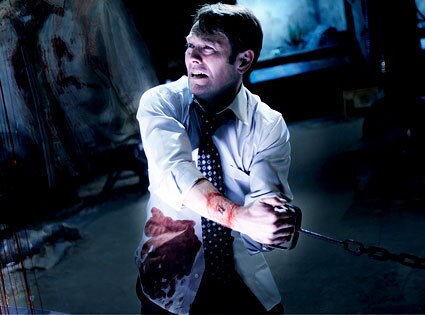Saw VI the Year's Best Supergory Movie About Health Insurance
 Capitalism beware! Michael Moore was a pussycat compared to Saw's John "Jigsaw" Kramer (Tobin Bell), whose we-mean-it-this-time last posthumous wish was apparently that vengeance be wrought upon predatory lenders and health insurance executives. No, really. Enjoy.
Capitalism beware! Michael Moore was a pussycat compared to Saw's John "Jigsaw" Kramer (Tobin Bell), whose we-mean-it-this-time last posthumous wish was apparently that vengeance be wrought upon predatory lenders and health insurance executives. No, really. Enjoy.The Bigger Picture: The Saw saga was meant to end with part three, which nicely concluded the diabolical life of both the Jigsaw killer and his apprentice Amanda (Shawnee Smith). Lionsgate, however, saw more dollar signs to be had, and in the hands of scribes Marcus Dunstan and Patrick Melton, a new storyline was superimposed upon previous events, adding needless layers of retroactive continuity and unveiling a far more annoying apostle of agony by the name of Detective Hoffman (Costas Mandylor).
After two irritating installments of unnecessary layer upon layer, this more straightforward sequel finally ties up the loose ends, without the gratuitous red herrings or continuity distortions that have become tedious trademarks.
New director Kevin Greutert, previously an editor on the series, gets back to basics: people in traps with a time limit take up the lion's share of screen time (literally—the setting is an abandoned zoo building), while the "outside world" portion of the tale highlights, without much complication, the metaphorical noose gradually tightening around Hoffman's neck, as he and Kramer's widow, Jill (Betsy Russell), enact the game master's last will and testament.
Would all the Saw sequels have been unnecessary had Kramer's health insurance policy simply covered an experimental cancer treatment? That's the amusingly "timely" notion at play here, as the man who denied him the full benefit, a weasely suit named William (Land of the Dead's Peter Outerbridge) is forced to come face-to-face with life-or-death decisions under the terms of Kramer's last (as if!) game.
The gore is ample, the Mandylor scenes limited, and even Scream Queens winner Tanedra Howard acquits herself well. Best of all, Smith returns for some additional flashbacks with Kramer, reminding viewers of the relationship that was always at the heart of the best installments.
Saw VI is not as elaborately plotted as prior sequels, but it doesn't need to be. After the last couple of halfassed tries, it's nice to have one that finally delivers a decent ending.
The 180—a Second Opinion: If Saw VI does well at the box office, the studio will undoubtedly find a way to further strain the storyline's credibility with more sequels...so please, if you want to see it, don't go opening weekend.




 10/24/2009 03:00:00 PM
10/24/2009 03:00:00 PM
 kenmouse
, Posted in
kenmouse
, Posted in
0 Response to "Saw VI the Year's Best Supergory Movie About Health Insurance"
Post a Comment
Leave Your Thoughts & We Will Discuss Together